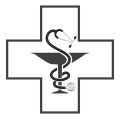Gastritis and Peptic Ulcer
Inflammation of the stomach lining (gastritis) and sores on the lining of the stomach (peptic ulcer) are both conditions that can cause abdominal pain and sometimes bleeding.

Causes
One common cause of gastritis and peptic ulcer disease is regularly taking non-steroidal anti-inflammatory drugs (NSAID), such as aspirin or diclofenac, especially when taken on an empty stomach or taken excessively.
Another cause is an infection in the stomach by specific bacteria called helicobacter pylori.
Other contributing factors include excessive alcohol intake and smoking cigarettes.
Signs and Symptoms
Some people have no symptoms. Other people may have abdominal discomfort, decreased appetite, feeling full after eating a small amount, nausea and vomiting.
Severe disease may hemorrhage, seen as hematemesis or melena.
Investigations
Taking a thorough patient history and physical examination are the only investigations required for mild cases of gastritis or peptic ulcer.
More severe cases may require a tube with a small camera to be inserted into the stomach through the patient’s mouth (upper endoscopy). This enables visualization of the stomach lining.
Investigations for helicobacter pylori should be done if suspected.
The hemoglobin level should be checked if there is hemorrhage (hematemesis or melena).
Treatment
Oral medications (for example Cimetidine) are the treatment for mild gastritis and peptic ulcer. Non-steroidal anti-inflammatory drugs (NSAID) should be ceased, as should alcohol consumption and cigarette smoking.
If infection with helicobacter pylori is suspected, then antibiotics will be required.
In cases of hemorrhage, then intravenous medications (such as Cimetidine) are required. Intravenous fluids and blood transfusion may also be required. The patient must be kept nil by mouth (NBM) and have a nasogastric tube inserted. Upper endoscopy is performed to identify site of bleeding, which can then be treated endoscopically. If bleeding is profuse then surgery may be required.


